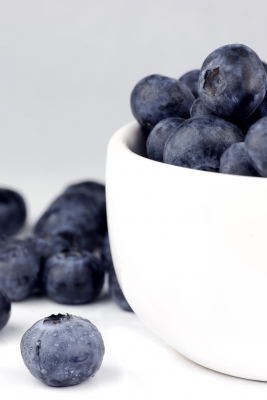Want to keep your brain working the way you want it to? Then one of the best things to do is to eat right! “Nutrition is very, very important to brain health,” says Paul Nussbaum, Ph.D., a clinical neuropsychologist and member of the scientific advisory board for the Alzheimer’s Foundation of America. “Surprisingly, the brain is made up of 60% fat – it’s the fattest part of our body—and the fat insulates the nerve tracks. Without that fat we slow down mentally,” Dr. Nussbaum says. It is important to realize that the kinds of fats and foods you eat can have an impact on the health of your brain. Here are some foods that are good for your brain and can help to reduce your risk of Alzheimer’s:
- Walnuts (and almonds, pecans, hazelnuts): Walnuts might be small, but they pack a huge nutritional punch. They are filled with Omega-3 fatty acids, which is the good kind of fat your brain needs. Walnuts also contain vitamin E and flavonoids, which can help protect the brain.
- Salmon (and mackerel, sardines, other fatty fish): These fish are also high in Omega-3s and can help to lower blood levels of beta-amyloid, a protein thought to play a role in Alzheimer’s. A Columbia University study found that the more Omega-3 fatty acids a person eats, the lower their blood beta-amyloid levels are.
- Berries: Berries contain polyphenols, which are a type of antioxidant which helps stop inflammation and allows brain cells to work better. “Antioxidants are like taking out the broom in the spring and sweeping the garage,”
- Spinach (and kale, other leafy greens): Leafy greens should be a diet staple since they are full of antioxidants and fiber. In a national study, women in their 60s who ate more leafy vegetables over time did better than their non-green eating counterparts on memory, verbal, and other tests.
- Turmeric: Studies have shown the turmeric, the spice used in curries, and its main active component curcumin, can help prevent Alzheimer’s. Try out this healthy spice the next time you cook!
- Coffee: Researchers from the University of South Florida and Miami found that people above the age of 65 who drank three cups of coffee a day developed Alzheimer’s disease two to four years later than their counterparts with lower caffeine levels, and that caffeine had a positive impact even in older adults who were already showing early signs of Alzheimer’s.
- Chocolate: Here is another reason for you to go ahead and eat more dark chocolate! Research has shown that dark chocolate, which contains flavonoids, can help combat heart disease and may also help to slow down the effects of dementia.
Be sure to try to add some of these foods into your diet, and hopefully they can help keep your brain healthy, and reduce your risk of Alzheimer’s.
Resource: http://www.huffingtonpost.com/2013/02/23/alzheimers-prevention_n_2734550.html




